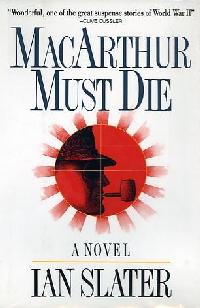MacArthur should have died
A "what if" thriller with no alternatives
By William Wetherall
First posted 15 April 2006
Last updated 15 April 2006
Ian Slater There is some exceptionally good writing in this generally suspenseful web-work of stories that converge and merge in love and war in Australia during the Pacific War. Slater was born in Australia and served in the country's navy and joint intelligence bureau, and the most gratifying scenes in MacArthur Must Die are those he views through Australian eyes and narrates in Australian diction. The plot is simple. An Australian woman and a Japanese man studying in Australia fall in love. The war begins while he is back in Japan for a family visit. She is criticized for dating him, while he tells no one in Japan about his romance with her, but both continue to harbor feelings that vacilate because of the war. The Japanese navy sends him back to Australia to assassinate General MacArthur, and while evading pursuit he shows up at her house. The dust jacket bills the story as "a 'what if' thriller" -- but alternative history works only if there is an alternative. In allowing MacArthur to survive the attempts on his life, Slater passes up an opportunity to explore what might have happened if the general had not been able to return to the Philippines as he had promised. Slater, who now lives in Canada, is a very prolific writer of military thrillers featuring past and future wars. Most titles in his WW III series involve Asia, and a few are set entirely or mostly in Asia. |
